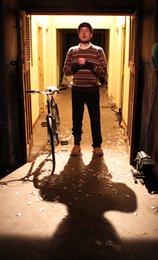On a day when a major supermarket was asking me to donate some of the food they had just sold me to a local charity for distribution to the poor, a play about poverty seemed particularly urgent. No-one can fault the ambition of director Paula McFetridge to prick the conscience of a society where the one in five of the title is the number of people living in poverty. McFetridge’s vision extended further to create a multi-authored mosaic of performance, installation and film in a venue far from the trendy lights of the big cities. Built around the original Victorian Workhouse, the venue is Limavady’s former hospital site, now the base for a charity founded in 1987 to address the needs of local unemployed people. The site is haunted by its past and fertile with contemporary resonances.
.jpg.aspx%3Fwidth=260&height=145) The production starts with an exhibition explaining the history and conditions of the workhouse. A fire alarm sounds and after a bit of kerfuffle, a surly teenager is made to stand on a chair to apologise to us for the false alarm. This is Slinky (Samantha Heaney), 36 nights short of her sixteenth birthday, whose monologues will thread through the evening. She is a case study in contemporary poverty: low educational attainment, a dysfunctional home background, living on an estate where unemployment is endemic. By the end we understand that she plans to escape to London to a life where she will be exploited by the very boyfriend on whom she has pinned her hopes. Then, in groups, the spectators move through the event in a different order, rejoining at key points.
The production starts with an exhibition explaining the history and conditions of the workhouse. A fire alarm sounds and after a bit of kerfuffle, a surly teenager is made to stand on a chair to apologise to us for the false alarm. This is Slinky (Samantha Heaney), 36 nights short of her sixteenth birthday, whose monologues will thread through the evening. She is a case study in contemporary poverty: low educational attainment, a dysfunctional home background, living on an estate where unemployment is endemic. By the end we understand that she plans to escape to London to a life where she will be exploited by the very boyfriend on whom she has pinned her hopes. Then, in groups, the spectators move through the event in a different order, rejoining at key points.
Direct audience address is the predominant performance mode. There’s a public lecture demonstration where a surgeon (Vincent Higgins) and his chief nurse (Abigail McGibbon) are preparing for an operation to sterilise a young benefit-dependent single m other (Stephanie Donohue). Her agreement is the price of a charity’s training, support and a place to live. In a disused workshop, we hear from four figures caught up in a traffic-accident insurance scam that goes wrong. In a scene staging a process of restorative justice where a young teenager (Stephanie Donohue) comes to meet a woman (Carol Moore) she has assaulted, we hear the thoughts of each delivered as interweaving interior monologues until the point where they play out the confrontation in the starkest of verbal exchanges. In short films, real people talk to camera about the effects of poverty today. In another film set in the paupers’ graveyard and shown in the workhouse dormitory, the dead speak to an out-of-shot interviewer. We walk to the graveyard itself, listening on headphones to a play for voices in which two grave-robbers discover that a corpse isn’t what they had expected. Talking heads give way to the resonant silences of photographs by Donal McCann, where the black and white stills accentuate the poverty’s etching into the faces of his subjects.
other (Stephanie Donohue). Her agreement is the price of a charity’s training, support and a place to live. In a disused workshop, we hear from four figures caught up in a traffic-accident insurance scam that goes wrong. In a scene staging a process of restorative justice where a young teenager (Stephanie Donohue) comes to meet a woman (Carol Moore) she has assaulted, we hear the thoughts of each delivered as interweaving interior monologues until the point where they play out the confrontation in the starkest of verbal exchanges. In short films, real people talk to camera about the effects of poverty today. In another film set in the paupers’ graveyard and shown in the workhouse dormitory, the dead speak to an out-of-shot interviewer. We walk to the graveyard itself, listening on headphones to a play for voices in which two grave-robbers discover that a corpse isn’t what they had expected. Talking heads give way to the resonant silences of photographs by Donal McCann, where the black and white stills accentuate the poverty’s etching into the faces of his subjects.
All powerful, but I’d question the extent to which the experience of this place of performance was fundamental to the material. Much of the evening could have been staged in a theatre with a higher degree of finish and focus; indeed I had the strong sensation that much of it could have been produced as effectively on radio. Yet even in this, while eschewing any single narrative allowed multiple voices to e merge, rarely did one get the sense of the complexity of real experiences of poverty. The juxtaposition of the vox pops with the dramatic monologues created a recurrently jarring sense of inauthenticity in the latter. The actors struggled at times to overcome the temptation to simplification.
merge, rarely did one get the sense of the complexity of real experiences of poverty. The juxtaposition of the vox pops with the dramatic monologues created a recurrently jarring sense of inauthenticity in the latter. The actors struggled at times to overcome the temptation to simplification.
The event overall seemed unfocused in its intention. While the audience learns about the despair of the unemployed and marginalised, we were never implicated in their situation by the direct address. Ironically with all the moments in which we were talked at, the most uncomfortable and affecting point in the entire evening was in the silence between the teenager and her victim, where inarticulate hopelessness and bourgeois prejudice tested the limits of our empathy. Elsewhere trawling through the underbelly began to feel like a touristic promenade in the misery of others. I left with the same conviction I had at the start that poverty is a blight on our society. Without a more rigorous exploration of the interdependence of the aesthetic and the political in this specific place and at this particular time, as a foundation for a theatrical experience, such a conviction on its own is misplaced.
Tom Maguire is Senior Lecturer in Theatre Studies at the University of Ulster.